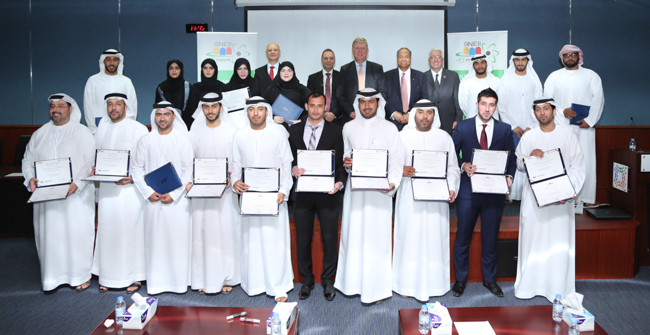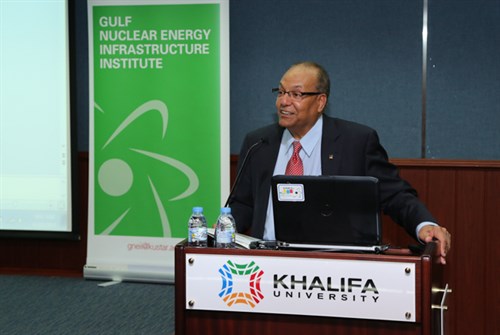
The Gulf Nuclear Energy Infrastructure Institute (GNEII) celebrated the graduation of its 2015 fellows with a symposium and graduation ceremony at Khalifa University in Abu Dhabi, United Arab Emirates (UAE). The annual symposium offers GNEII fellows an opportunity to share the results of their study and to network with other academics, professionals, and government officials in their area.
Fellows presented their capstone projects on day one, with two projects selected to be presented to a wider audience at the ceremony on day two of the symposium. The projects selected were “Evaluation of Threats by Drones to Nuclear Power Plants” and “Evaluation of UAE Security Culture – Insider Threat.”
On day two, a keynote address titled “Regional Perspectives on Nuclear Security” was given by Al Sharif Nasser bin Nasser, the managing director of the Middle East Scientific Institute for Security based in Amman, Jordan. Nasser bin Nasser laid out a strong argument for the regional benefit of programs like GNEII and the need for qualified professionals in nuclear energy in the region. Day two also included presentations of the two selected capstone projects as well as a poster session.
This year’s symposium was attended by representatives from key entities from the UAE, the US government, and Sandia National Laboratories. Texas A&M University and Texas Engineering Experiment Station (TEES) were represented by Dr. Yassin Hassan, department head and professor of nuclear engineering. This year the Texas A&M Department of Nuclear Engineering and the TEES Nuclear Security Science and Policy Institute (NSSPI) supplied three instructors for the GNEII courses: senior lecturer Dr. Cable Kurwitz; associate professor Dr. Karen Vierow; and NSSPI deputy director Dr. David Boyle.

Dr. Yassin Hassan speaks at GNEII symposium
GNEII is a regional institute, housed at Khalifa University, whose objective is to immerse future nuclear program decision makers in safety, safeguards, security, and nonproliferation concepts and to familiarize them with how these concepts apply in a regional and international context. Under the guidance and support of the US Department of Energy/National Nuclear Security Administration and the US Department of State, the key implementing partners in the US include Sandia National Laboratories and NSSPI, whose responsibilities included developing the curriculum, providing instructors, and preparing Khalifa University staff and GNEII program alumni to become permanent GNEII faculty. This is the fifth year of the program.